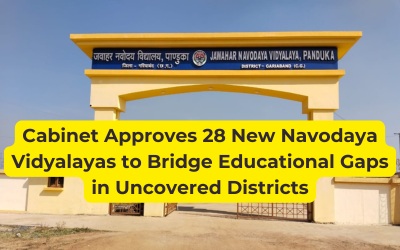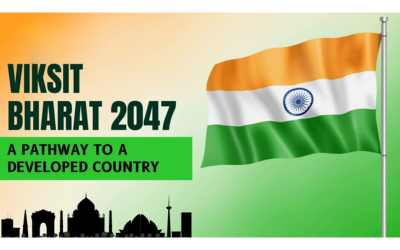Table of Contents
ToggleCabinet Approves 28 New Navodaya Vidyalayas to Bridge Educational Gaps in Uncovered Districts
The Cabinet Committee on Economic Affairs, chaired by Prime Minister Shri Narendra Modi, has approved the establishment of 28 new Navodaya Vidyalayas (NVs) in the uncovered districts of India under the Navodaya Vidyalaya Scheme (Central Sector Scheme). The list of these 28 NVs is annexed.
The total estimated funding required for setting up these 28 NVs is Rs. 2359.82 crore, spread over five years from 2024-25 to 2028-29. This includes a capital expenditure component of Rs. 1944.19 crore and an operational expenditure of Rs. 415.63 crore.
To implement the project, an administrative structure will be created in line with the norms set by the Samiti for operating a fully-fledged NV with a capacity of 560 students. Consequently, 15680 students (560 x 28) will benefit from these new schools. According to current norms, a fully-fledged NV provides employment to 47 individuals.
Therefore, the 28 approved NVs will offer direct permanent employment to 1316 individuals. Additionally, construction and related activities for developing the school infrastructure are expected to generate employment opportunities for many skilled and unskilled workers. Due to their residential nature, each Navodaya Vidyalaya will create opportunities for local vendors to supply essential commodities such as food, consumables, furniture, teaching materials, and services from local providers like barbers, tailors, cobblers, and manpower for housekeeping and security services.
NVs are fully residential, co-educational schools that provide high-quality modern education from Class VI to XII to talented children, predominantly from rural areas, regardless of their family’s socio-economic status. Admissions to these schools are based on a Selection Test, with approximately 49,640 students admitted to Class VI in NVs each year.
As of now, there are 661 sanctioned NVs across the country, including second NVs in 20 districts with large SC/ST populations and 3 special NVs. Out of these, 653 NVs are currently operational.
In line with the National Education Policy 2020, almost all NVs have been designated as PM Shri schools, showcasing the implementation of NEP 2020 and serving as exemplar schools for others. The scheme is well-regarded, and there has been a steady increase in the number of students applying for admission to Class VI in NVs each year. In recent years, NVs have seen increasing enrollment of girls (42%), as well as SC (24%), ST (20%), and OBC (39%) children, ensuring that quality education is accessible to all.
The performance of Navodaya Vidyalaya students in CBSE board examinations has consistently been the best among all educational systems. NV students excel in various fields such as engineering, medical science, armed forces, and civil services, on par with the best talent from urban India.
Admission Process for Navodaya Vidyalayas
Eligibility Criteria for Navodaya Vidyalaya:
Class VI: Candidates must be studying in Class V in a recognized school in the same district where the Navodaya Vidyalaya is located. The age of the candidate should be between 9 to 13 years.
Class IX (Lateral Entry): Candidates must be studying in Class VIII in a recognized school in the same district. The age of the candidate should be between 13 to 16 years.
Class XI (Lateral Entry): Candidates must have passed Class X from a recognized school. The age of the candidate should be between 14 to 18 years.
Selection Test:
Jawahar Navodaya Vidyalaya Selection Test (JNVST): This is the entrance exam for admission to Class VI. It is a non-verbal test designed to assess the candidate’s mental ability, arithmetic skills, and language proficiency.
Lateral Entry Selection Test (LEST): This test is for admission to Class IX and XI. It includes objective-type questions covering subjects like Mathematics, Science, English, and Social Science.
Application Process:
Online Registration: Candidates need to register online through the official Navodaya Vidyalaya Samiti (NVS) website. The application forms are usually available from September to November for Class VI and from October to December for Class IX and XI.
Submission of Documents: Candidates must submit the required documents, including proof of residence, age, and educational qualification, along with the application form.
Examination and Results:
Examination Date: The JNVST for Class VI is usually conducted in April, while the LEST for Class IX and XI is conducted in February.
Result Declaration: The results are declared on the official NVS website. Selected candidates are informed through the respective schools and district authorities.
Admission Formalities:
Document Verification: Selected candidates need to undergo document verification at the respective Navodaya Vidyalaya. They must provide original documents for verification.
Medical Examination: Candidates must undergo a medical examination to ensure they are fit for residential schooling.
Final Admission: After successful verification and medical examination, candidates are admitted to the respective Navodaya Vidyalaya.
Important Points to Remember:
Free Education: Navodaya Vidyalayas provide free education, including boarding, lodging, uniforms, and textbooks.
Reservation Policy: There is a reservation policy in place for SC/ST, OBC, and girls to ensure inclusive education.
Special Provisions: Special provisions are made for children with disabilities to ensure they have equal opportunities for admission.
For more detailed information and to apply, you can visit the
Historical Context and Vision
The Navodaya Vidyalaya Scheme was initiated under the National Policy on Education, 1986, with the vision to provide quality education to talented children from rural areas. The scheme aims to bridge the educational divide between urban and rural areas by offering free, high-quality education to students who might otherwise lack access to such opportunities.
Educational Excellence
Navodaya Vidyalayas follow the CBSE curriculum and emphasize holistic development, including academics, sports, arts, and cultural activities. The schools have consistently achieved high pass percentages in CBSE board exams, with a pass rate of 99.71% for Class X and 98.93% for Class XII in recent years.
Infrastructure and Facilities
Each NV is equipped with modern infrastructure, including well-equipped classrooms, science and computer labs, libraries, and sports facilities. The residential nature of these schools ensures a conducive learning environment, with hostels, dining facilities, and recreational areas provided for students.
Impact on Rural Education
NV have played a significant role in uplifting rural education by providing opportunities for students from economically and socially disadvantaged backgrounds. The schools have also contributed to the socio-economic development of the regions they are located in by generating employment and supporting local businesses.
National Education Policy 2020
The NEP 2020 aims to transform the Indian education system by promoting inclusive and equitable education for all. It emphasizes the importance of mother tongue instruction, holistic development, and vocational training from an early age. Navodaya Vidyalayas, as PM Shri schools, are at the forefront of implementing these reforms and serving as model institutions for others to follow.
Future Prospects
With the approval of 28 new NVs, the government aims to further expand the reach of quality education to underserved regions. This initiative is expected to enhance educational outcomes, promote social equity, and contribute to the overall development of the nation.
Community Engagement and Support
Navodaya Vidyalayas also play a crucial role in community engagement. They often organize outreach programs, health camps, and educational workshops for the local community. This not only helps in building a strong bond between the school and the community but also ensures that the benefits of education extend beyond the students to their families and the wider community.
Alumni Success Stories
The alumni of Navodaya Vidyalayas have gone on to achieve great success in various fields. Many have become prominent figures in engineering, medicine, the armed forces, civil services, and other prestigious professions. Their success stories serve as an inspiration to current students and highlight the transformative power of quality education.
Environmental Initiatives
NVs are also committed to environmental sustainability. Many schools have implemented green initiatives such as rainwater harvesting, solar power generation, and organic farming. These initiatives not only teach students the importance of environmental conservation but also contribute to the sustainability of the school operations.



